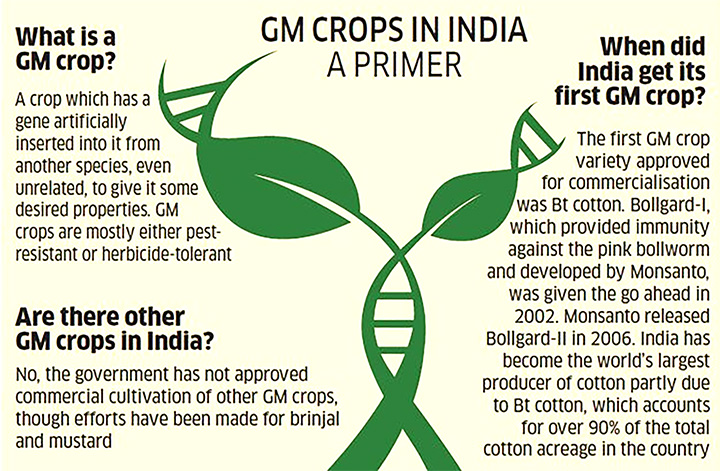Demand for Import of Genetically Modified Soy Seeds | 03 Aug 2021
Why in News
The poultry industry is demanding a permit for the import of crushed genetically modified (GM) soy seeds for captive consumption of farmers from the Central government.
- Non-fiscal and fiscal relief measures which include the restructuring of term loans and additional working capital has also been demanded from the Centre and State governments.
Key Points
- GM Crops:
- A GM or transgenic crop is a plant that has a novel combination of genetic material obtained through the use of modern biotechnology.
- For example, a GM crop can contain a gene(s) that has been artificially inserted instead of the plant acquiring it through pollination.
- Conventional plant breeding involves crossing of species of the same genus to provide the offspring with the desired traits of both parents.
- Genus is a class of items such as a group of animals or plants with similar traits, qualities or features.
- Cross breeding can take a long time to achieve desired results and frequently, characteristics of interest do not exist in any related species.
- Bt cotton is the only GM crop that is allowed in India. It has alien genes from the soil bacterium Bacillus thuringiensis (Bt) that allows the crop to develop a protein toxic to the common pest pink bollworm.
- Herbicide Tolerant Bt (Ht Bt) cotton, on the other hand is derived with the insertion of an additional gene, from another soil bacterium, which allows the plant to resist the common herbicide glyphosate.
- In Bt brinjal, a gene allows the plant to resist attacks of fruit and shoot borers.
- In DMH-11 mustard, genetic modification allows cross-pollination in a crop that self-pollinates in nature.
- A GM or transgenic crop is a plant that has a novel combination of genetic material obtained through the use of modern biotechnology.
- Status of GM Soyseeds in India:
- India allows the import of GM soybean and canola oil.
- Import of GM soya bean seeds has not been approved in India.
- The main fear is that import of GM soya bean will affect the Indian soya bean industry by contaminating non-GM varieties.
- Reasons for the Demand:
- The outbreak of Covid-19 has created a massive crisis which led to an initial depletion of demand in chicken products owing to false news about the linkage between the virus and poultry products.
- This created an unwarranted financial crisis and led to the erosion of working capital (used for day-to-day operations).
- Since the last several months, high speculation activities in soya contracts on National Commodity and Derivatives Exchange Limited (NCDEX) has been disturbing the sector.
- The NCDEX is an online commodities exchange dealing primarily in agricultural commodities in India.
- The rise in the soybean process had led to the skyrocketing of prices of eggs and chicken products in the retail market.
- The import for the particular time frame will stabilise the raw material market.
- Approval Process for GM crops in India:
- In India, the Genetic Engineering Appraisal Committee (GEAC) is the apex body that allows for commercial release of GM crops.
- Use of the unapproved GM variant can attract a jail term of 5 years and fine of Rs. 1 lakh under the Environment Protection Act, 1986.
- Food Safety and Standards Authority of India (FSSAI) is the authorised body to regulate the imported crops in India.
- Some Related Initiatives:
- Poultry Venture Capital Fund (PVCF):
- The Department of Animal Husbandry and Dairying is implementing it under “Entrepreneurship development and Employment generation” (EDEG) of the National Livestock Mission.
- It is a bankable programme and the Central Government is providing subsidy through National Bank for Agricultural and Rural Development (NABARD) for those beneficiaries taking loan for PVCF.
- National Livestock Mission:
- Different programmes under the National Livestock Mission under which financial assistance is provided to States/Union Territories for implementation of Rural Backyard Poultry Development (RBPD) and Innovative Poultry Productivity Project (IPPP).
- Assistance to States for Control of Animal Diseases (ASCAD) Scheme:
- ASCAD under “Livestock Health and Disease Control” (LH&DC) which covers the vaccination of economically important poultry diseases viz., Ranikhet Disease, Infectious Bursal Disease, Fowl Pox etc., including control and containment of emergent and exotic diseases like Avian Influenza.
- Poultry Venture Capital Fund (PVCF):

